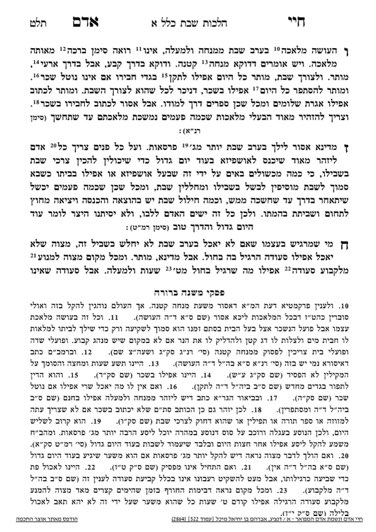We are continuing in siman 8, discussing the idea of eating the Shabbos seudos l’teiavon, with an appetite. We have discussed eating on Friday afternoon when it will affect one’s appetite for Shabbos. Today, we will discuss snacking on Shabbos itself in a way that affects one’s appetite for the seudos.
The Biur Halacha, in siman 249, quotes the Darkei Moshe, who quotes the Ohr Zarua, who writes that the baalei tosafos report a minhag in which people would sit down for a Shabbos seuda and make kiddush, but then pause and eat different types of mezonos. This minhag is practiced by some chassidim nowadays. The Ohr Zarua was not happy with this minhag, because he felt that one diminishes their appetite for the seudos. However, the Darkei Moshe disagrees, and writes that we are not concerned that one will be unable to eat l’teiavon. The Magen Avraham disagrees, and follows the Ohr Zarua. The Mishnah Berurah paskens in accordance with the Magen Avraham.
The Shulchan Aruch Harav comes to explain and justify this minhag. He explains that people would eat mezonos before the seudah in order to make sure they recited 100 brachos on Shabbos. The Gemara tells us that Dovid Hamelech instituted a takana that a person should say 100 brachos daily. During the week, where we have 19 brachos in shemoneh esrei, the three shemoneh esrei give us 57 brachos to start, so to reach 100 is not so difficult. On Shabbos, where shemoneh esrei is only 7 brachos, we only gain 28 brachos through shemoneh esrei (including mussaf), so there is more of a concern that one will not reach 100 brachos.
This explanation of the Shulchan Aruch Harav addresses the reason for the minhag, and possibly addresses why it is not a bracha she’einah tzricha, an unnecessary bracha (although this point is of significant debate). However, it does not address eating the seuda l’teiavon, as practically one may diminish their appetite by practicing this minhag.
The Biur Halacha points out that the Shulchan Aruch Harav would agree with the concern of diminishing one’s appetite, and only came to address the concern of unnecessary brachos. If so, if a person eats a minimal amount of mezonos, such that they do not affect their appetite, it would not affect the issue of l’teiavon, and would also help reach 100 brachos. However, if a person is eating a large amount, such that it would affect their appetite for the seudah, all would agree that it is a concern.
Another suggestion given to address this minhag is as follows. We know that the seudos on Firday night and Shabbos day are only valid if one washes. There is a machlokes whether one must wash for shalosh seudos. According to the opinion that one does not need to wash for shalosh seudos, maybe we can flip the meals around, and one will not wash for the second meal and wash for the third meal. In that way, the kiddush attended or snacks consumed (for which one did not wash) will be considered the second meal, and later, when the person washes, it will be considered the third meal. The additional benefit to this idea is that the most chashuv meal of Shabbos is the second meal, so even if one does not wash for it, maybe the benefit of eating it l’teiavon overrides the disadvantage of not washing.
However, the Mishnah Berurah writes that one only fulfills the second meal by washing. Thus, in a scenario where a person is going to a kiddush before eating their seudah at home, the kiddush will only be considered the second seudah, which one can not be yotzei without bread. If they wash at the kiddush, then it could be considered the second seuda, and the subsequent meal will be the third meal. The Chazon Ish does suggest that maybe one could make this argument, but the Mishnah Berurah is not comfortable with it. Therefore, one should be mindful not to overly snack before the second seudah, whether at a kiddush or just at home, in order to eat the second seudah l’teiavon.
Summary
In order to eat the Shabbos seudos l’teiavon, one must be careful not to snack too much on Shabbos itself in a way that will cause them to lose their appetite for the seudos.
Click here to watch Rabbi Reingold performing Pesach Model Seder.



